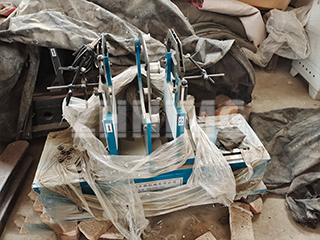Granite mechanical components are manufactured using granite as the raw material through precision machining. As a natural stone, granite possesses high hardness, stability, and wear resistance, enabling it to maintain long-term stable performance in high-load, high-precision working environments. Therefore, it is widely used in the manufacturing of foundation components for precision equipment and high-precision instruments. Common mechanical components include bases, brackets, worktables, precision guides, support platforms, and machine tool beds.
Granite’s Physical Properties:
1. High Hardness: Granite has a high hardness, typically 6-7 on the Mohs scale, meaning it is highly resistant to wear and tear, capable of withstanding heavy mechanical loads and less susceptible to wear or deformation.
2. Low Thermal Expansion: Granite’s low thermal expansion coefficient prevents significant dimensional changes with temperature fluctuations, enabling it to maintain high precision and stability. Therefore, granite is particularly important in high-precision machinery.
3. Excellent Stability: Granite is highly stable and not easily affected by the external environment. It has strong resistance to pressure, corrosion, and vibration. It maintains stable geometry and structural strength over long periods of use. 4. High Density and Low Porosity: Granite’s high density and low porosity make it highly resistant to shock and vibration in mechanical components, helping to improve the stability of precision equipment.
5. Excellent Shock Absorption: Due to granite’s high density and unique crystal structure, it effectively absorbs mechanical vibration, reducing vibration interference during equipment operation and improving the operating accuracy of mechanical equipment.
Application Areas:
1. Machine Tool Foundation Components: Granite is widely used in the manufacture of machine tool beds, worktables, guide rails, and other components. These components must withstand heavy loads and maintain a high degree of geometric precision. Granite’s high hardness, low thermal expansion, and stability make it an ideal material.
2. Precision Measuring Instruments: Granite is often used in the manufacture of bases and supports for precision measuring instruments. The accuracy of measuring instruments requires high material stability. Granite, with its excellent stability and shock absorption properties, can reduce the impact of environmental changes on measurement accuracy.
3. Optical Instruments: Granite is also widely used in optical instruments as a support platform or base. Due to its high density and low coefficient of thermal expansion, granite can effectively reduce the impact of temperature changes and external vibration on the performance of optical equipment, thereby ensuring the accuracy of optical instruments.
4. Basic components of high-precision equipment: This includes the foundational components of microscopes, electron microscopes, CNC machine tools, and other equipment. Granite’s high stability and shock resistance play a crucial role in these devices.
5. Aerospace: In the aerospace industry, granite is often used to manufacture precision structural components such as engine mounts and control system brackets. Granite’s stability and durability ensure that these components maintain their performance even in challenging environments.
Advantages of granite mechanical components:
1. High Precision and Stability: Due to its high stability, low thermal expansion, and strong vibration resistance, it can maintain high precision and stability in precision equipment over the long term.
2. Durability: Its high wear and pressure resistance allows it to withstand long-term workloads, is not easily damaged, and has a long service life.
3. Shock Resistance: Its high density and structure give it excellent shock absorption properties, effectively reducing the impact of external vibration on precision equipment.
Post time: Sep-03-2025

